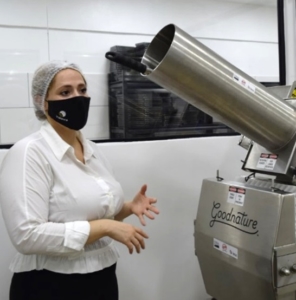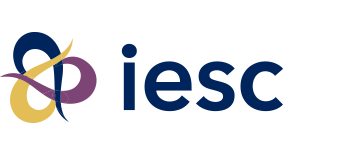Chef and Entrepreneur Serves Up Flavor and Profits
There are a few reasons why people might prefer an alternative to pizza made with classic wheat-based dough, for example, food allergies or taste preferences. Dominican Chef Valeria García saw an opportunity for her to re-imagine pizza and transform the way diners consume this popular dish. After studying abroad at the Culinary Institute of America in Hyde Park, New York, she created a recipe for pizza dough that uses cauliflower-based vegetable flour.

Chef Valeria García shows off Valance’s new processing equipment.
In 2017, García established her vegetable processing company and called it Valance, a nod to her name and the nutritional power of the vegetables that drive her business. Designing recipes is hard work on its own, but making food profitable is an added challenge. Even when García could source enough vegetables to make her signature flour, the company’s outdated machinery worked against
her—she could not make pizza dough fast enough to meet demand. García also had trouble finding reliable suppliers, which affected pricing and limited her ability to sustainably grow production.
García was connected to USDA-funded Exporting Quality and learned about its in-kind grant program for processing equipment. García submitted an application for better processing equipment that could churn through cauliflower fast enough to match the growing demand for her wheat-free dough.
Exporting Quality helped García secure the new machinery at a time when Valance’s buyers grew from 10 to 15 merchants. With the new machinery, Valance was able to keep up with demand; in fact, the company doubled its purchase of ingredients, representing more than a 500% increase in productivity.
The Exporting Quality’s market linkages team also helped García identify new regional suppliers. García had been working with as many as five suppliers at a time, and their volatile pricing affected Valance’s profit margins. Through an inward buyer mission, García established fixed prices with suppliers and guaranteed her weekly supply quantities.
Finally, Exporting Quality’s experts helped García with branding, marketing, and product development so she could make the most of the processing power of her new equipment.
“Exporting Quality helped us more than double our production and sales while helping reduce material costs by 50%. Together we created five new vegetable flour-based products,” said García. “Exporting Quality took our business to the next level of success.”
Today, Valance sells heat-and-eat cauliflower-crust pizza to top supermarket chains in the Dominican Republic. With its commitment to quality, growth, and innovation, Valance is not just one of the country’s small businesses to watch — it is also García’s dream come true.
Exporting Quality Program in the Dominican Republic, funded by the United States Department of Agriculture ‘Food for Progress’ initiative and implemented by IESC, focuses its efforts on increasing productivity and sales for domestic and export markets of high-value fruit and vegetable global value chains: avocado, cocoa, pineapple, and greenhouse and Asian vegetables. The program also supports efforts to increase product quality, production efficiency, the value of post-harvest products, and to improve marketing and market linkages.



